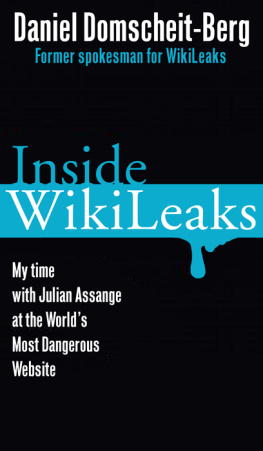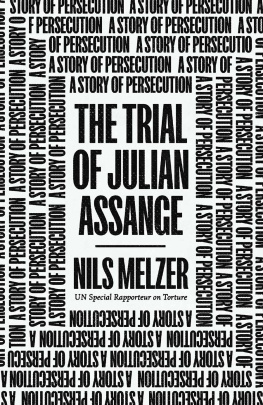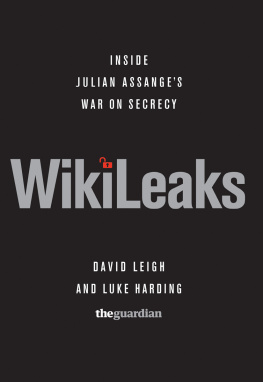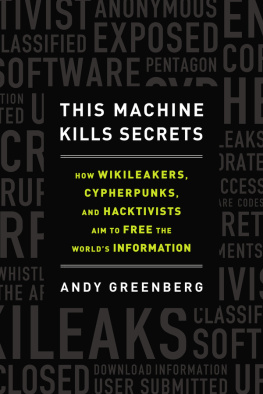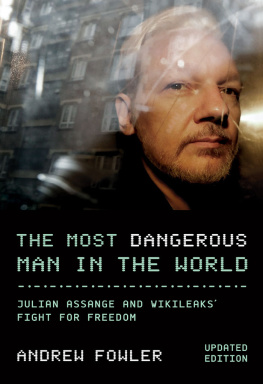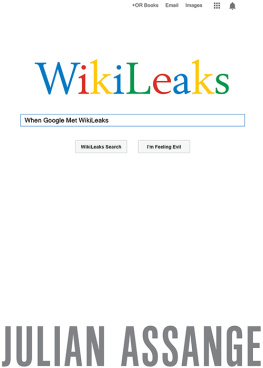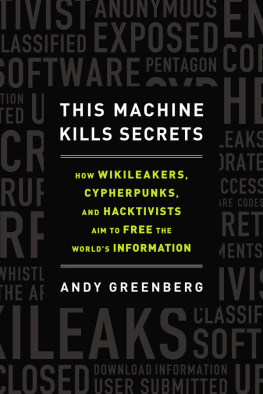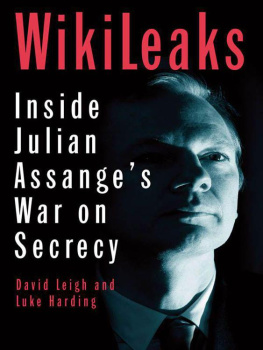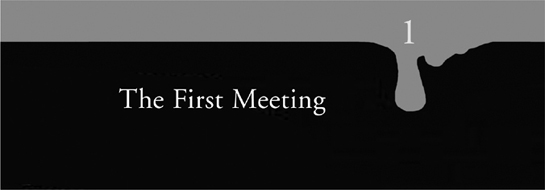A LOT of people are responsible for the existence of this book and the story behind it, and I would like to give my thanks especially to:
Tina Klopp for sharing two productive months and writing out all my stories in such a short time.
My editor, Silvie Horch, and the rest of the excellent team at Econ Books, without whose expertise and flexibility there would have been no way this book could have been published so quickly.
My agent, Barbara Wenner, for her first-rate assistance from the genesis of this book to its publication and beyond.
The colleagues at the foreign publishers who translated this book so that it could be published in seventeen countries thus far. In particular, Charlie Conrad from Crown Publishers in America for valuable feedback on the books content.
The attorneys Markus Kompa and Dr. Sven Krger, as well as Amanda Telfer and Matthew Martin, for invaluable feedback on the content.
My family, for giving me the values that make me who I am.
My wife, Anke, who is my equal, and my son, Jacob.
The Chaos Computer Club and its chaotic members, for too many things to list.
The makers of Club-Mate. What would I be without you? Probably very tired.
The Internet, for always striking back.
Everyone who was directly or indirectly involved in the WL show over the past three years. Without you, nothing would have been possible.
The numerous sources whose material we published. If a few more people had your courage, the world would be a much better place.
Julian Assange, for manifesting an idea and bringing it into my life.
The OpenLeaks team, for keeping up the good work!
T ODAY, in January 2011, Im at much the same point as I was a year ago, when we thought it would be possible to reestablish WL on a new footing. With OpenLeaks, were trying to build up something we believe is the best way to solve a few of the worlds problems. If 2010 was the year of media hype, 2011, we hope, will be the year of substance.
As I was writing my story, new facts were revealed and some of my questions were answered. At the same time, the picture of WikiLeakss actual situation has become increasingly opaque. We are flooded by media information, and this encourages conspiracy theories, rumors, and myths, creating confusion and deflecting attention from the genuine issues.
In order to dispel the confusion and clear up the mysteries surrounding WL, we need answers to certain questions. They include:
What is WikiLeakss financial situation? What have donations been used for? And who decides how money is allocated?
What is the current organizational and decision-making structure? How are responsibilities divided up?
What did Julian mean when he reportedly told the Guardian that he had a financial interest in how and when the diplomatic cables were published?
What roles do WLs representatives in Russia and Scandinavia, Israel Shamir and Johannes Wahlstrm, a father an son with a record of anti-Semitism, play at WikiLeaks?
What kinds of deals have Wahlstrm and Shamir arranged with media outlets?
Are there other WL brokers who have provided media outlets with material, and if so, on what terms?
Do Julian Assange, other people involved with WikiLeaks, or their companies profit from any such deals?
Only when the specific facts are sorted out will we understand how things have come to be the way they are. Only then can we answer the question of what went wrong with WikiLeaks and the brilliant idea of using a state-of-the-art tool to make matters of urgent public concern truly transparent.
Our society needs citizens capable of thinking and acting on their own. People who do not shy away from critical questions because theyre afraid of being disappointed. Our society needs individuals who are able to distinguish good information from bad and to make good decisions based on that knowledge, instead of relinquishing all personal responsibility to messiahs, leaders, and alpha wolves.
I have often been asked if my departure from WikiLeaks was disillusioning. I always answered in the affirmative. In the beginning, I was particularly disillusioned in an emotional sense. But in the past few weeks, especially in the course of working on this book, I came to realize that disillusionment also means being freed from illusions. That is constructive. It helps you to better understand your reality. And that, perhaps, is a truly good omen.
D ANIEL D OMSCHEIT -B ERG is a computer scientist who worked in IT security prior to devoting himself full-time to WikiLeaks. He remains committed to freedom of information on the Internet. Today he and other former WikiLeaks people are working on a more transparent secret-sharing website called OpenLeaks to be launched in early 2011. He lives in Berlin with his family.
T INA K LOPP was born in 1976 in Hamburg. She received a degree from the German School of Journalism in Munich and was the recipient of the Friedwart Bruckhaus Prize in 2006 and the 2010 Radio Play Prize of the German Literary Foundation. She currently works as a journalist at Zeit Online.
I FIRST heard about WikiLeaks in September 2007. A buddy of mine told me about it in a chat. At the time, we were regular readers of cryptome.org, the whistle-blower website run by John Young. It had made the headlines, among other things because lists of agents working for MI6, the British secret service, had been published there in 1999 and 2005. Cryptome published documents from people who wanted to reveal secrets without running the risk of being branded traitors. It was the same idea WikiLeaks was based on.
Ironically, many people initially assumed that some international secret service was actually behind WikiLeaksthat the platform was a so-called honeypot, a trap offering people a platform for revealing secrets where they would actually be arrested if they uploaded anything controversial. The predominant attitude was one of mistrust.
Then in November 2007, the handbooks from Guantnamo Bay, the Camp Delta Standard Operating Procedures, appeared on WikiLeaks. They revealed that the United States was violating internees human rights and the Geneva Conventions at their military base in Cuba. Three things were immediately clear to me.
One: It was absurd to think that WikiLeaks was a secret-service front.
Two: The project had the potential to become much, much bigger than Cryptome.
Three: WikiLeaks was a great idea. For people whod been active from the beginning in these sorts of communities, the Internet was not a global sea of data, but a village. If I needed a reliable opinion about something, I knew where to ask. So thats what I did, and the answer was always: WL? Its a fantastic idea. That encouraged me to learn more. I logged in to a chat room, which still exists today on the WikiLeaks site, and started making contacts. I got the sense immediately that these people were the same as me. They were interested in the same issues. They worked the same ungodly hours. They talked about social problems and believed that the Internet offered previously unimaginable solutions. After a day of this, I asked if there was anything I could do. At first I got no answer. I was confused and a bit insulted. Still, I kept participating in the chat.

